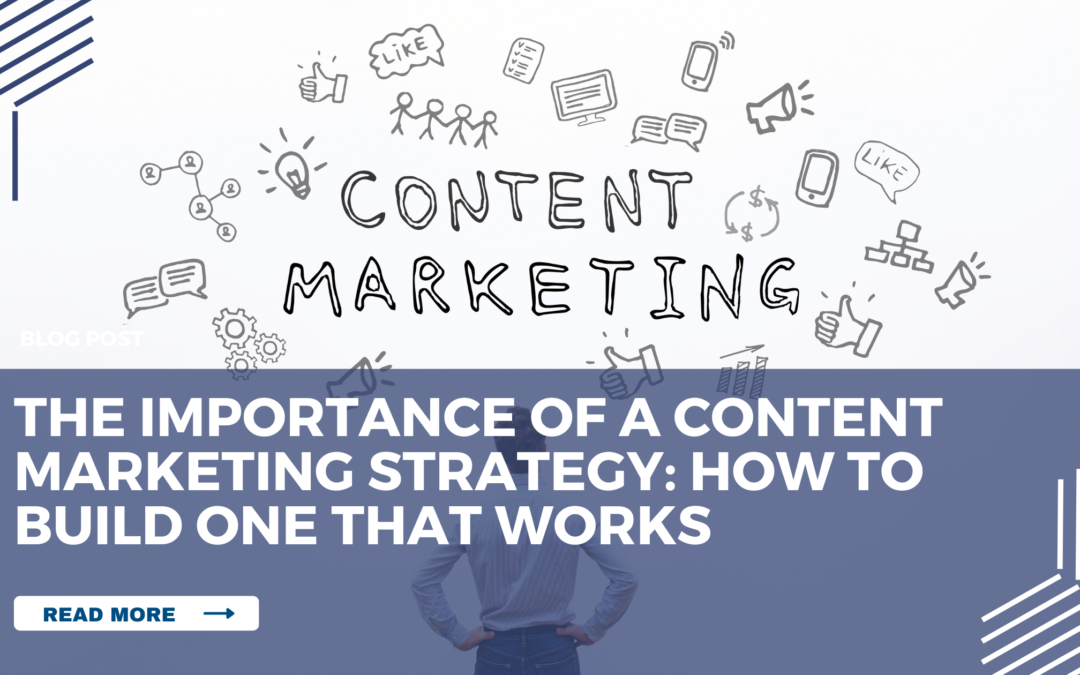In today’s digital age, content marketing has become a crucial aspect of any successful marketing strategy. With the increasing amount of noise and competition online, creating valuable and engaging content can help businesses stand out from the crowd as well as build relationships with their target audience.
However, simply creating content is not enough. To truly maximize the impact of your content, you need a strategic approach to content marketing. An effective content marketing strategy allows you to define your goals, identify your target audience, and create a plan for creating and distributing content that resonates with them.
In this article, we’ll explore the importance of a content marketing strategy and provide a step-by-step guide for building one that works. From defining your target audience and setting SMART goals to creating a content calendar and measuring your success, we’ll cover everything you need to know. So, whether you’re just starting out with content marketing or looking to take your strategy to the next level, keep reading to learn more!
Why a Content Marketing Strategy is Important
Helps establish brand authority and thought leadership
Content marketing allows businesses to create and distribute valuable, informative, and engaging content that helps establish them as an authority in their industry. By providing useful information to their target audience, businesses can build trust and credibility, positioning themselves as a thought leader in their field.
Increases brand visibility and reach
With so much competition in the digital marketplace, it can be difficult for businesses to stand out and reach their target audience. A content marketing strategy can help businesses increase their visibility and reach by creating and promoting content that resonates with their audience and meets their needs.
Generates leads and drives sales
Content marketing can help businesses attract new leads and nurture them through the sales funnel. By creating content that addresses their audience’s pain points and interests, businesses can build relationships with potential customers and guide them towards making a purchase.
Improves search engine rankings
Search engine optimization (SEO) is an important aspect of content marketing. By optimizing their content for keywords and other SEO best practices, businesses can improve their search engine rankings and drive more organic traffic to their website.
Some examples of how to successfully leveraged content marketing strategies
HubSpot
HubSpot is a software company that provides marketing, sales, and service software to businesses. Their blog is one of the most well-known examples of effective content marketing, providing readers with informative and actionable content on topics such as inbound marketing, lead generation, and social media marketing. Their content has helped them establish themselves as thought leaders in their industry and attract millions of visitors to their website.
Airbnb
Airbnb is a travel and hospitality company that has leveraged content marketing to inspire and inform their customers. They have created a range of content, from city guides to travel stories, that showcases the unique experiences that travelers can have through their platform. Their content has helped them build a community of engaged and loyal customers who see Airbnb as more than just a booking platform.
These are just a few examples of companies that have successfully leveraged content marketing strategies to achieve their business goals. By creating high-quality, informative, and engaging content that resonates with their audience, these companies have built strong brands and established themselves as thought leaders in their respective industries.
At Darksky Digital, we help our clients develop and execute effective content marketing strategies that align with their business goals. Our team of experienced content marketers can assist with everything from content ideation and creation to promotion and measurement. Therefore, helping businesses achieve maximum results from their content marketing efforts.
How to Build a Content Strategy
Define your target audience and develop buyer personas
The first step in building a content marketing strategy is to define your target audience. This includes understanding their needs, pain points, interests, and behaviors. Once you have a clear understanding of your target audience, you can develop buyer personas that represent different segments of your audience. Buyer personas can help you create more targeted and relevant content that resonates with your audience.
Conduct a content audit to assess current content assets and identify gaps
A content audit involves analyzing your existing content assets to assess their quality, relevance, and effectiveness. This can help you identify gaps in your content strategy and opportunities for improvement. A content audit can also help you determine which content types and topics are resonating with your audience.
Set SMART goals for your content marketing efforts
SMART goals are specific, measurable, achievable, relevant, and time-bound. Setting SMART goals for your content marketing efforts can help you focus your efforts and measure your progress. For example, a SMART goal for your content marketing strategy might be to increase website traffic by 20% within the next 6 months.
Determine the type of content that resonates with your target audience
Based on your target audience and buyer personas, you should determine the type of content that resonates with them. This can include blog posts, videos, infographics, whitepapers, case studies, and more. You should also consider the format and style of your content, such as the tone of voice, writing style, and visual elements.
Create a content calendar to plan and organize content creation and distribution
A content calendar is a schedule that outlines the content you plan to create and distribute over a specific period of time. This can help you stay organized and ensure that your content is consistent and aligned with your business goals. Your content calendar should include the content type, topic, publication date, and distribution channel.
Develop a distribution plan for your content
Creating great content is only half the battle. You also need to ensure that your content reaches your target audience. A distribution plan involves identifying the channels through which you will distribute your content. The channels can include social media, email, or search engines. You should also consider the timing and frequency of your content distribution.
Monitor and measure the effectiveness of your strategy and adjust as needed
To ensure that your content marketing strategy is effective, you need to monitor and measure your results. This can include tracking metrics such as website traffic, engagement, lead generation, and conversion. Based on your results, you can adjust your strategy as needed to improve your results.
By following these steps, businesses can create a content marketing strategy that is tailored to their target audience and aligned with their business goals.
Best Practices for Effective Content Marketing
Focus on quality over quantity
Creating high-quality content is more important than producing a large quantity of mediocre content. Quality content can help establish your brand as a thought leader in your industry and build trust with your audience. Quality content is also more likely to be shared and linked to, which can improve your search engine rankings.
Use data to inform your content strategy
Data can provide valuable insights into your audience’s needs, behaviors, and preferences. Analyzing data such as website analytics, social media engagement, and customer feedback, helps you understand your audience. This data allows your business to create more effective content for your audience.
Create a mix of evergreen and topical content
Evergreen content is content that remains relevant over time. Topical content is timely and relevant to current events or trends. A mix of evergreen and topical content can help keep your content fresh and engaging for your audience.
Optimize your content for search engines
Search engine optimization (SEO) involves optimizing your content to rank higher in search engine results pages (SERPs). This can include using keywords, meta descriptions, and title tags, as well as improving website speed and mobile responsiveness.
Promote your content through multiple channels
To ensure that your content reaches your target audience, promote it through multiple channels, such as social media, and email. This can help increase the visibility and reach of your content.
Engage with your audience and respond to feedback
Engaging with your audience can help build stronger relationships and increase brand loyalty. Responding to comments, feedback, and questions can show your audience that you value their input and are committed to providing them with valuable content.
Continuously evaluate and adjust your strategy
Content marketing is an iterative process, and it’s important to continuously evaluate and adjust your strategy based on your results. Regularly monitoring metrics such as website traffic, engagement, and lead generation can help you identify areas for improvement. Therefore allowing you to make any necessary adjustments to achieve the desired results.
By following these best practices, businesses can create more effective and engaging content that resonates with their audience and achieves their business goals.
Final Thoughts
Developing a content marketing strategy is an essential component of any successful digital marketing plan. By creating and distributing high-quality content that addresses the needs and interests of their target audience, businesses can establish themselves as thought leaders. Furthermore, businesses can increase their brand visibility and reach, generate leads and drive sales, and improve their search engine rankings.
To build an effective content marketing strategy, businesses should start by defining their target audience and goals, conducting research to inform their content creation, creating a content calendar, and promoting their content through multiple channels. They should also focus on quality over quantity, use data to inform their strategy, create a mix of evergreen and topical content, optimize their content for search engines, engage with their audience, and continuously evaluate and adjust their strategy based on their results.
At Darksky Digital, we understand the importance of a strong content marketing strategy. We work closely with our clients to develop and execute strategies that achieve their business objectives. Whether you need help with content creation, promotion, or measurement, our experienced team of content marketers can provide the expertise and support you need to achieve maximum results from your content marketing efforts.
If you’re looking to build or improve your content marketing strategy, contact Darksky Digital today. Learn more about how we can help you achieve your business goals through effective content marketing.
GET IN TOUCH

